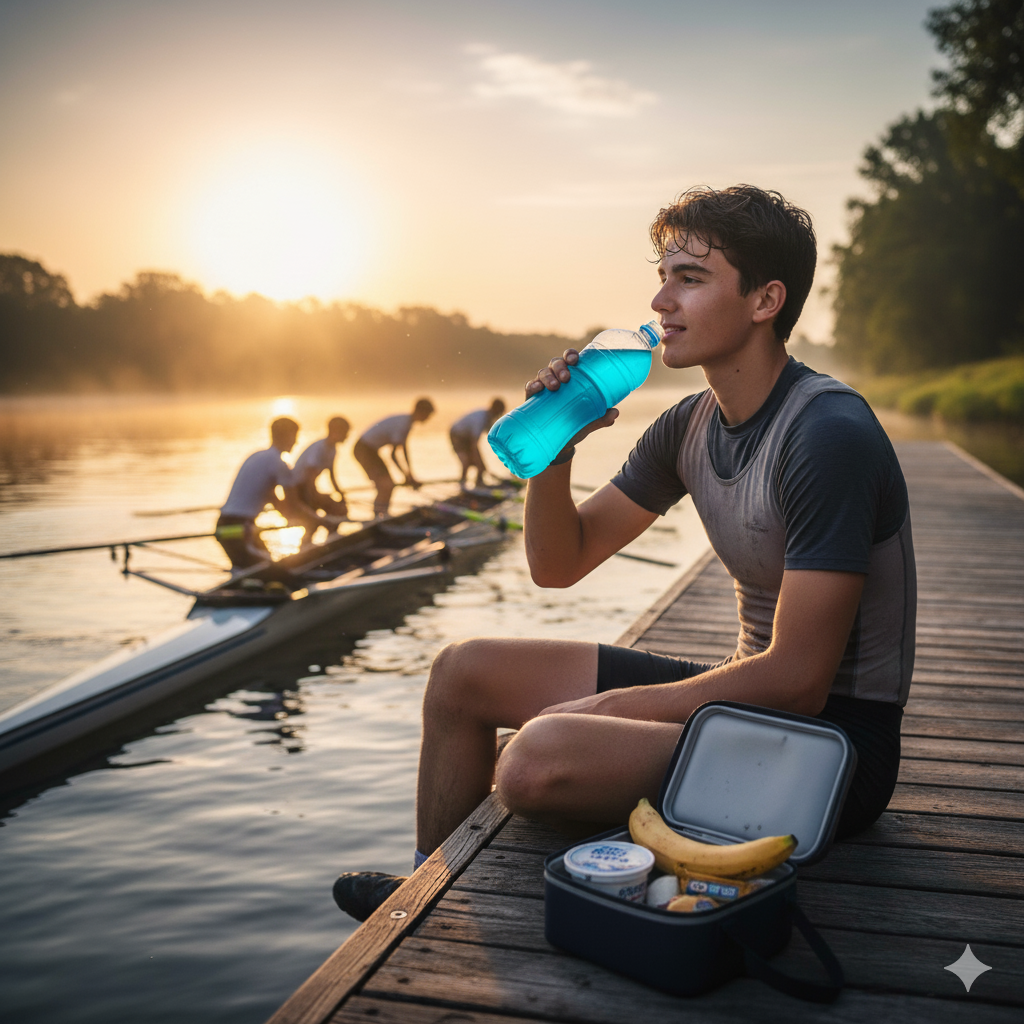
“Coach, why am I so tired all the time?” It’s a question heard frequently from dedicated high school rowers, and the answer often lies not just in the demanding hours on the water and in the erg room, but in how their bodies are being fueled and recovered. Training 10-12 hours per week, these athletes are burning an immense amount of energy, and without proper nutritional support, their bodies simply can’t keep up.
This article will break down the essential nutritional and lifestyle pillars for high school rowers to optimize their performance, maintain energy levels, and support healthy growth and development.
Caloric Needs: Fuelling the Machine
Given the rigorous training schedule of 10-12 hours per week, high school rowers fall squarely into the “very active” category, and often even beyond. Their caloric needs are significantly higher than the average student to support growth, daily activities, and intense athletic demands.
- Male High School Rowers: These athletes will likely need 3,000 – 4,000+ calories per day. For particularly intense training blocks or during periods of rapid growth, some may even require up to 5,000 calories.
- Female High School Rowers: Female rowers will typically need 2,500 – 3,500+ calories per day. Similarly, higher demands during peak training or growth spurts could push this higher.
Key takeaway: Under-eating is a common problem and a primary cause of fatigue, poor performance, and increased risk of injury. Athletes need to understand that calories are not the enemy; they are the fuel for their sport!
Nutrient-Dense Foods: Quality Over Quantity
While the sheer volume of calories is important, the quality of those calories is paramount. Rowers need nutrient-dense foods that provide sustained energy, aid recovery, and support overall health.
- Complex Carbohydrates (The Primary Fuel): These should make up the bulk of a rower’s diet. They provide sustained energy and help replenish glycogen stores (the stored form of carbohydrates in muscles and liver).
- Examples: Whole grains (oats, brown rice, quinoa, whole-wheat bread/pasta), sweet potatoes, starchy vegetables (peas, corn).
- Lean Proteins (Building and Repair): Essential for muscle repair, growth, and recovery after strenuous workouts.
- Examples: Chicken breast, turkey, fish (salmon, tuna), lean beef, eggs, Greek yogurt, cottage cheese, legumes (lentils, beans), tofu.
- Healthy Fats (Energy and Health): Provide concentrated energy, support hormone production, and aid in nutrient absorption.
- Examples: Avocados, nuts (almonds, walnuts), seeds (chia, flax), olive oil, fatty fish.
- Fruits and Vegetables (Vitamins, Minerals, Antioxidants): Crucial for all bodily functions, immune health, and fighting exercise-induced oxidative stress.
- Examples: A wide variety of colorful fruits and vegetables daily.
Hydration Levels: The Unsung Hero of Performance
Even slight dehydration can significantly impair performance, increase fatigue, and elevate the risk of heat-related illness. Rowers sweat a lot, often in warm conditions, making hydration critical.
- General Recommendation: Aim for at least 3-4 liters (100-135 fluid ounces) of water per day. This needs to increase on training days.
- Before Training: Drink 500-700ml (17-24 oz) of water 2-3 hours before a workout.
- During Training: Sip on water regularly throughout practice. For sessions over 60 minutes or in hot conditions, an electrolyte drink can be beneficial to replace lost sodium and potassium.
- After Training: Replenish fluids by drinking 1.5 times the weight lost during exercise. Weighing yourself before and after practice can help determine fluid needs.
Sleep Recommendations: The Ultimate Recovery Tool
Sleep is where the magic happens – muscles repair, hormones rebalance, and the brain processes information. High school athletes, especially those with demanding training schedules, need more sleep than their sedentary peers.
- Target: Aim for 8-10 hours of quality sleep per night. This is non-negotiable for optimal recovery and performance.
- Prioritize Sleep: Treat sleep with the same importance as training and nutrition.
- Create a Routine: Establish a consistent bedtime and wake-up time, even on weekends.
- Optimize Your Sleep Environment: Dark, quiet, and cool room. Avoid screens (phones, tablets, computers) for at least an hour before bed.
Pre- and Post-Fueling: Strategic Nutrition
Strategic timing of nutrients around workouts is crucial for sustained energy and efficient recovery.
- Pre-Workout (1-3 hours before): Focus on easily digestible complex carbohydrates and a little protein. Avoid high fat or fiber to prevent stomach upset.
- Examples: Oatmeal with fruit, whole-wheat toast with a small amount of peanut butter, a banana, a sports bar.
- During Workout (for longer sessions >60 min): If training for more than an hour, especially high-intensity, consume easily digestible carbohydrates.
- Examples: Sports drink with carbohydrates and energy gels.
- Post-Workout (within 30-60 minutes): This is the “recovery window.” Focus on rapidly absorbed carbohydrates to replenish glycogen and protein for muscle repair.
- Examples: Chocolate milk, Greek yogurt with fruit, turkey sandwich on whole-wheat bread, a recovery shake with protein and carbs.
Sample Daily Meal Plan for a High School Rower
(This is a sample and needs to be adjusted based on individual hunger, training load, and preferences. Focus on building meals around nutrient-dense choices.)
Breakfast
- Meal: Large bowl of oatmeal (made with milk) topped with berries, nuts/seeds, and a drizzle of honey.
- Side: 2-3 scrambled eggs or a piece of whole-wheat toast with avocado.
- Drink: Water
Mid-Morning Snack (During school, around 10:30 AM)
- Meal: Apple with a handful of almonds or a protein bar.
- Drink: Water
Lunch (During school, around 12:30 PM)
- Meal: Large turkey and cheese sandwich on whole-wheat bread with lettuce, tomato, and a side of baby carrots and hummus.
- Side: A piece of fruit (orange or grapes).
- Drink: Water
Pre-Afternoon Training Snack (Before leaving school for practice, around 3:30 PM)
- Meal: Banana and a small handful of pretzels OR a granola bar.
- Drink: Water
Afternoon Training (e.g., 4:30 PM – 6:30 PM On the water/Erg/Weight Training)
- During Training: Water, potentially an electrolyte drink for longer/hotter sessions.
Post-Afternoon Training (Immediately after, 5:45 PM)
- Meal: Recovery shake with whey protein and a carbohydrate source (e.g., juice or fruit) OR a container of Greek yogurt with granola.
- Drink: Large bottle of water
Dinner (Around 7:00 PM)
- Meal: Large serving of grilled salmon or chicken breast.
- Side 1: Generous portion of brown rice or quinoa.
- Side 2: Large serving of roasted vegetables (broccoli, bell peppers, sweet potato).
- Drink: Water
Evening Snack (If hungry, around 9:00 PM)
- Meal: Cottage cheese with pineapple, or a small bowl of cereal with milk.
- Drink: Water or herbal tea.
By prioritizing these nutritional and lifestyle strategies, high school rowers can transform their “tired all the time” into sustained energy, improved performance, and a healthier, more successful rowing career. Remember, your body is your most important piece of equipment – fuel it wisely! You can consult Dr Arthur, Dr Shay at Corner on Wellness Chiropractic Center or a Sports Nutritionist to review your fueling needs for a successful rowing season.
Related Articles
https://www.britishrowing.org/wp-content/uploads/2016/10/Nutrition-Guide.pdf
https://worldrowing.com/2015/12/02/fuelling-the-sponge-using-nutrition-improve-performance
CONTACT
Better health and wellness is just a click or call away
UPCOMING EVENTS
WIN a Laser Treatment for sharing, referring, or giving a Google Review!
October 1 - October 31CLOSED
November 1CLOSED
November 8Happy Veteran’s Day
November 11





